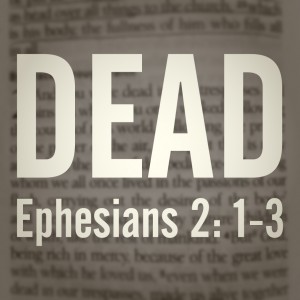In the New Testament, the word “dead” (Gk., nekros) means “lifeless, useless, or separated.” Never does it mean “nonexistent” (Vance, Other Side of Calvinism, 220).
 Very rarely does it refer to something that is completely unable to act.
Very rarely does it refer to something that is completely unable to act.
Examples of “Dead” in Scripture
So, for example, the prodigal son was “dead” to his father while he was separated from him (Luke 15:24, 32). While the prodigal son was in the far country, he certainly existed and was certainly active, but was not functioning properly in his role as a son.
In James 2, faith is described as “useless” and “unprofitable” when it is separated from works. Dead faith is not a nonexistent faith, but a separated or useless faith. This means that even Christians can have dead faith.
This idea is brought out by the Apostle John as well in the last book of the Bible, when he records the Letters to the Seven Churches. In Revelation 3, even living Christians can be described as “dead.” In the Letter to the Church of Sardis, the Christians are described as having life, but being dead, because there was a problem with their works (Rev 3:2-3).
In all these examples, the word “dead” can be best understood as “separated,” or “ineffective and useless at its intended purpose.”
7 Different Kinds of Death in the Bible
Once we begin to see that this is the definition of “dead” in Scripture, we can discern at least seven different kinds of death (or separations) in the Bible.
- There is spiritual death, where the spirit is separated or cut off from God, and so is ineffective or useless in helping the person connect with God and live as they should (cf. Gen 2:17).
- There is physical death, which is where the body is separated from the soul and the spirit (Heb 9:27; John 11:11-17). It is physical death that most people think of when they refer to “death.”
- Thirdly, there is eternal death, which is when a person is separated eternally from God (Rev 20:14; Matt 25:46).
- There is positional death, which occurs when believers die to sin as a result of undergoing death and resurrection through Jesus Christ (Rom 6:3-6; Gal 2:2).
- There is relational death, which occurs when we are separated from friendships and relationships as a result of sin (Luke 15:24; 1 Tim 5:6; Rev 3:2-3).
- Sixth, there is an operational death, which is when we are unable to function and operate for our intended purposes because we rely upon works of the flesh or refuse to act upon what we believe (Jas 2:14-26; Heb 6:1; 9:14).
- Finally, there is sexual death, which occurs when a person’s sexual organs are no longer able to function as they were intended (Rom 4:17-19).
“Dead” Means “Separated”
As can be seen, in every single case, good synonyms for “death” might be “separation” or “uselessness.”
- Spiritual death is separation from God, or uselessness for God.
- Physical death is the separation of the soul from the body, and when this happens, the body become useless.
- Eternal death is separation of the body, soul and spirit from God forever.
- Positional death is separation of the believer from what he used to be in the old man, so that in our new man, are no longer useful for sin, death, and the devil.
- Relational death is the separation of fellowship from friends, family members, and even from God.
- Operational death is separation from right living, and a right testimony toward others.
- Finally, sexual death is a separation from the ability to physically reproduce.
Dead Does not Mean “Total Inability”
Obviously, none of these uses of the word “dead” in Scripture imply “total inability.”
Quite to the contrary, we often find that after people are described as being “dead” in one of the ways listed above, they are then invited in the following context to turn from death and practice life.
So in passages like James 2:14-26 and Revelation 3:1-6, people are called to reverse their state of death by energizing their faith or repenting and returning to the way they used to live.
At the same time, when Paul writes that in Christ we are “dead to sin” (Rom 6:3-6; Gal 2:2) this does not mean that Christians have a “total inability” to sin, or that there is no sin in the Christian’s life. Far from it! We all sin every day. What Paul means is that the Christian is separated from sin. We are no longer ruled by sin. We are no longer in bondage to sin. But we do still sin, as every Christian knows.
I included this study here today because tomorrow we are going to look at Ephesians 2:1-3, which is a popular Calvinistic proof text for total depravity and total inability, and I wanted to get the definition of “dead” out of the way now. What are your thoughts on the word “dead”? When you read this word in Scripture, how do you understand it?
If you want to read more about Calvinism, check out other posts in this blog series: Words of Calvinism and the Word of God.



Dead means dead in sin-like me. I seek self-gain in eveything, I want to compete and win,seem unique,useful and special to others, draw in more people to glorify me and praise me and care for me (they would do so for their own ends, of course). But, there is no true human love. Humans love just to serve their own ends. This kind of love makes me feel empty and makes me mad,depressed and I don’t have words to describe the feeling-like I’m blind,I’m wearily longing death,I lose hope and purpose in life.
But when I realize the love of jesus and accept him as my lover, I am a source of life to everyone and though I’m weak in selfish sin, christ helps me overcome.He pours his love in me and I am alive!!!
Good description of death. I like the description of being blind, weary, losing hope and purpose. This describes the “separation” of death quite well, for these are not the things God designed us to feel, and when we are dead in sin, we are not feeling the life that God wants for us.
Thanks!
I agree with your definition. Seems in keeping with the Word. When Adam’s experience with “hearing the voice of God” following his sin with that of the Prodigal son, it seems “separation” is definitely the more accurate definition. Adam is the template for the biblical meaning.
Thanks again for your ministry. Extremely insightful, to say the least.
Selah!
” in Christ we are “dead to sin” (Rom 6:3-6; Gal 2:2) this does not mean that Christians have a “total inability” to sin, or that there is no sin in the Christian’s life. Far from it! We all sin every day. What Paul means is that the Christian is separated from sin. We are no longer ruled by sin. We are no longer in bondage to sin. But we do still sin, as every Christian knows. ”
I don’t think this fully takes into account the distinction Paul makes between the believer who must continue to rely upon Christ’s sacrifice to cover their sins, and the one for whom the new covenant has become actualized in the indwelling of the Holy Spirit. It is only the latter to whom Paul directs his comments concerning the law “that was added because of transgressions”, or “the handwriting of ordinances that were against us”. He is referring to Deuteronomy 31:26, and too many people conflate the law that was inside the Ark chisled into stone with the law that was beside the Ark on a scroll.
Doing away with the scroll doesn’t do away with sin. Doing away with sin does away with the scroll. The new covenant is explicitly stated for the purpose of “keeping my laws”. At no time does God ever suggest that the new covenant allows one to sin. Paul concurs by pointing out that those who “walk after the spirit do not fulfill the lust of the flesh”. In other words, they don’t sin. He isn’t referring to all Christians; just those who are called (“elect”), each in their proper order. Some of us aren’t there yet, and we need to remember that just because we sin, doesn’t mean that the gospel message is invalid for those who are called now to perfection.
The problem is in assuming we are reborn and regenerated under the new covenant while we continue to sin. That was the old covenant. This isn’t good news. The good news is that it will never be by our own “will and effort”(these are the conditions of the old covenant), but by God’s promise to not only save us from sin, but to insure the indwelling of the Holy Spirit, in, with, and through Christ according to the promise of the Father’s grace and will to perfect obedience in conformity to Christ.
God’s commandments are promises. You shall not commit adultery is not a promise for some future time when no one marries in heaven anyways, but a promise of fidelity in this life for the redeemed, AND reborn believers. To hear the good news is to enter into the kingdom which began with John Baptist and continues today. It is not a promise for some future day of salvation. Today is the day of salvation, and only legalistic Pharisees not only not entering themselves, but blocking entrance to the kingdom as they look for some future event that will never come for them.
There is no sin in Christ, and those who are in Christ cannot sin.
What about the dead in Christ that’s talked about in 1st Thessalonians 4:17? Shouldn’t they have been included somewhere?
where in the King James version of the Holy Bible does it say something about the dead have no cares of this world?
I had recently come to the conclusion that there were 3 types of death in the Bible which, understood, made seeming contradictions in scripture solved.
I got the bright idea today to ask Google how many ways the term “death” was used in the bible and I was happy to find your website and see the further ways enumerated by you.
So thank you very much and God bless you, Dennis Clough